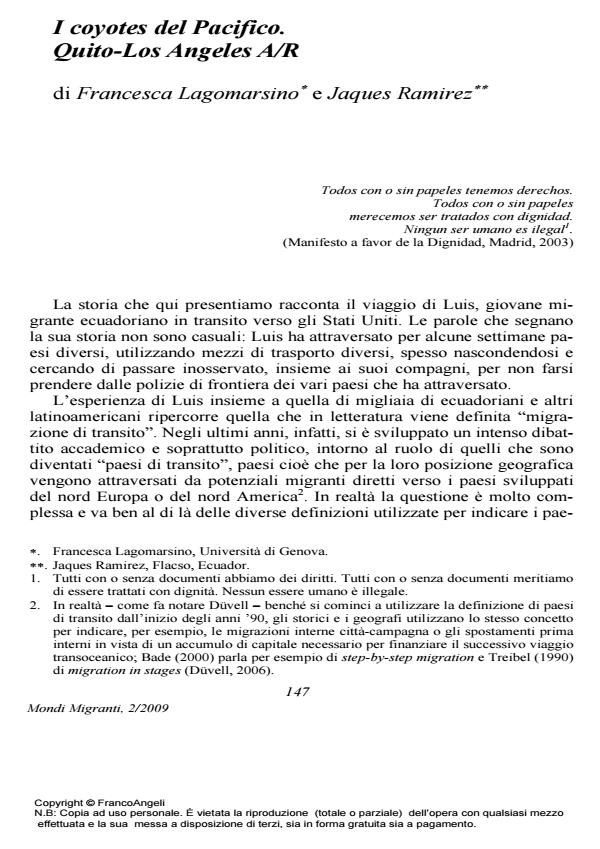I coyotes del Pacifico. Quito-Los Angeles A/R
Journal title MONDI MIGRANTI
Author/s Francesca Lagomarsino, Jacques Ramirez
Publishing Year 2009 Issue 2009/2
Language Italian Pages 14 P. 147-160 File size 463 KB
DOI 10.3280/MM2009-002010
DOI is like a bar code for intellectual property: to have more infomation
click here
Below, you can see the article first page
If you want to buy this article in PDF format, you can do it, following the instructions to buy download credits

FrancoAngeli is member of Publishers International Linking Association, Inc (PILA), a not-for-profit association which run the CrossRef service enabling links to and from online scholarly content.
The coyotes of the Pacific Route - Quito - Los Angeles Return) In this contribution we present the story of Luis (the interview reported here was made in Quito in 2008, after he came back from Ecuador), a young Ecuadorian migrant in transit to the United States. Luis travelled through different countries for some weeks, using different means of transport and often hiding himself, together with his fellows, not to be captured by the border police of the various transit countries. The experience of Luis and of thousands Ecuadorians and other Latin Americans is called in literature "transit migration". Starting from the experience of this young migrant, we would like to reflect on the meaning that the so-called "transit countries" have taken in the last few years. These are countries that, due to their geographical position, are crossed by potential migrants travelling towards the developed countries of Northern Europe or North America. This is a very complex issue. In fact, today there is not a universally accepted definition of the terms "transit migrants" and "transit countries" and there is no specific category identifying them in the international law. However, today the debate on the issue is very intense not only at academic level but especially at political level, since the issue on the role played by the transit countries in controlling and managing irregular immigration (as it can be observed in the case of the agreements between Italy and Libya) is increasingly more crucial and determining. The political concern on the role of the transit countries is closely linked to the security and control anxieties of the rich neighbouring countries. We talk about transit countries from the point of view of restrictive migrant policies that try to block the incoming flows perceived as dangerous and substantially undesired. Finally, it is important to stress that the exacerbation of controls at the borders and the huge difficulties in having legal access have favoured the development of the industry of clandestinity, where coyoteros, chulqueros, intermediaries of various type, have become essential subjects. In this respect the case of the way to the United States is paradigmatic. The more the controls have become exacerbated, the more a capillary and organised system of illegal immigration management has developed. Those countries that rhetorically declare that they fight against human traffickers are the first ones to increase the development of these organisations, through clearly disastrous policies that do not manage to block arrivals of migrants but make the travel very dangerous and violate their rights as human beings.
Keywords: Transit migration; migration policy; America latina
- Underground Europe Luca Queirolo Palmas, Federico Rahola, pp.261 (ISBN:978-3-031-16150-6)
- Underground Europe Luca Queirolo Palmas, Federico Rahola, pp.143 (ISBN:978-3-031-16150-6)
Francesca Lagomarsino, Jacques Ramirez, I coyotes del Pacifico. Quito-Los Angeles A/R in "MONDI MIGRANTI" 2/2009, pp 147-160, DOI: 10.3280/MM2009-002010